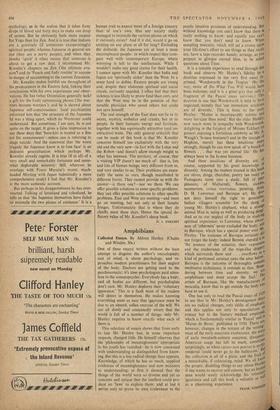Amphibians
ONE of these essays; written without the least attempt to disguise the author's encyclopaedic cast of mind, is about psychology, and re- proaches modern practitioners for their neglect of the body. Doctors are getting used to the psychosomatic; it's time psychologists paid atten- tion to the somatopsychic. Everybody has a body, and all bodies are different, but psychologists don't care. Mr. Huxley deplores their 'voluntary ignorance.' This is a fault most of his readers will detect in themselves. He makes knowing everything seem so easy that ignorance must be due to an absurd, sullen exercise'of the will. We are all dimly and contentedly aware that the world is full of a number of things; only Mr. Huxley requires to know exactly what each of them is.
This selection of essays shows that from early to late Mr. Huxley has, in some important respects, changed little. He himself observes that the 'philosophy of meaninglessness' appropriate to his youth has vanished—he is now concerned with understanding as distinguished from know- ing. But this is a less radical change than appears. Knowledge, of which he has so much, supplied evidences of meaninglessness and now ministers to understanding; at first it showed that the things of the world were so diverse and yet so concrete and unique that the intellect could pro- duce no 'laws' to explain them; and at last it serves only to prove its own irrelevance to the SPECTATOR. NOVEMBER 4, 1960 purely intuitive processes of understanding. But 'without knowledge you can't know that the re is really nothing to know; and equally you can't know that you don't need to know. When sampling mescalin, which will set a crown upon your life-time's effort to see things as they really are, have a tape-recorder handy; arrange, as you prepare to glimpse eternal bliss, to be asked questions about Time. It is a notable experience to read through this book and observe Mr. Huxley's fidelity to a doctrine expressed in the very first essay re'
printed, 'Wordsworth in the Tropics ' (By the way, more of Do What You Will would have been. welcome; and it is a great p.tv that only 3 fragment of the Pascal essay survives.) This doctrine is one that Wordsworth is held to have neglected, namely that 'our immediate intuitions are of diversity.' This is basic to the early Huxley: 'Matter is incomparably subtler and more intricate than mind.' But the older Huxley' now much more in sympathy with Wordsworth. delighting in the lstigkeit of Meister Eckhart (al present enjoying a fortuitous celebrity as Mr. A. Waugh's 'Is-ness business') and in the inscaPc of Hopkins, merely has these intuitions More strongly, though he can now speak of 'a bunch of flowers . . . that was yet eternal life.' He has always been in the Is-ness business.
And these intuitions of diversity are, of
course, supported by his great knowledge of diversity. Among the matters treated in this boot are olives, drugs, churches, poetry (an essay 00 Famagusta turns into a study, full of Pure pleasure, of Mallarme), flowers, cicadas, mesmerism, coitus reservatus, painting, dung' D. H. Lawrence and Baroque art. He does not deny himself the right to generalise' Indian villagers scramble for the dung of young Mr. Huxley's elephant; what a strange animal Man is, using as well as producing And so to our neglect of the body in studying spiritual experience; to Lawrence, whose aware' ness of 'otherness' never excluded the body; and to Baroque, which has a special power over Mr" Huxley. The ecstasies of Baroque certainly did not forget the body; indeed Bernini overdid it 'the posture of the ecstatics, their expression and the exuberance of the tripe-like draPerY which surrounds them and . . . overflows in /1, kind of peritoneal cataract onto the altar beloW.* Baroque is the outcome of thoroughly sorra° meditative techniques; it reminds us that, 'flotny dering between time and eternity, wee amphibians and must accept the fact.' artists of Baroque, like the manufacturers of mescalin, know that to get outside the body YOU have to use it. One has only to read the Pascal essay of 1929 to see that in Mr. Huxley's development there
,
are no radical changes, only shifts of engnasis; and this applies not only to speculations ecstasy but to the literary method employed, which is fundamentally similar in 'Pascal' and in `Maine de Biran,' published in 1950. There are' however, changes in the texture of the writing: poses most of the early essayistic exuberance, the p0at; of early twentieth-century essayism, disal Pe American usage has left its mark, sorm thlies surprisingly, as when cacare non poterat is raout rendered 'could never go to the bathroom• of the collection is all of a piece, and the fruit a remarkable, if exhausting, mind. We all kn°11 the proper, disabling things to say about IF uxie/ if one wants to recover self-esteem; but an honest man would surely acknowledge his yob ntaell r5( ignorance and call this book a valuable as W
FRANK KEIW














































 Previous page
Previous page